
BENJAMIN STARK – WRITER/DIRECTOR
This Teddy Roosevelt quote has worked its way into the fiber of my feature debut as a director, despite the fact that I had never heard it during the film’s development or production.

The Nocturnal Third is about a directionless young man who is confronted with a situation that demands he find a direction. Eli Gottfried is too young to be married, in too much debt to be comfortable, and too comfortable to be paying attention. He works a dead-end job at a rural stone-cutting facility, and gets wrangled into working a late shift, where the politics and tensions of the community around him somehow come to a head, despite the occasional solace of a new ally. What begins as a coming-of-age story ends as a tense, corporate espionage thriller.
The film, as I mentioned, is my feature debut as a director, but not my feature debut in general. I produced Lee Fanning’s science fiction adventure A Genesis Found in 2008. Going into production on our second feature film, I was confident that our filmmaking group, Wonder Mill Films, could do anything.
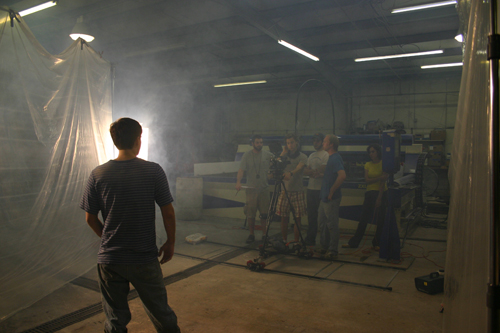
As I stand on the other end of the process, I’m more enraptured by what we can not and could not do. I discovered some very counter-intuitive truths during the three-year-long process.
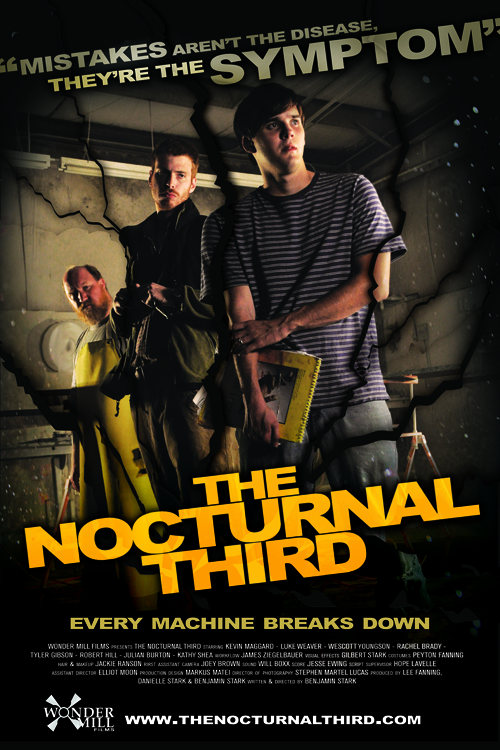
2008 – Script: Start Personal, End Universal
We’ve all heard the writing cliche “write what you know”, and that seemed to be a wise starting point for The Nocturnal Third. I drew on my childhood experiences working at my parents’ stone-cutting shop. My family was nice enough to employ me during my few dry months after I graduated college, as I was trying to figure out how to make films as aggressively as I was able to at school. I worked a few lonely late shifts, watching paranoid Orson Welles movies like The Trial and Mr. Arkadin in my down time, and the idea for The Nocturnal Third was born. The story came first: that of a frustrated young artist having to quell a sabotage attempt at a factory. The location seemed like a naturally oppressive and cold setting, and after getting the okay from my parents’ company, writing began. The biggest challenge in writing was to take this very personal kernel for a story and adapt it into something somewhat universal, without losing its specificity. It helped a lot to take myself out of the surrogate lead role, allowing Eli to be a much less disgruntled and sarcastic curmudgeon. Hopefully, the script takes the reader on a journey from a very specific, seemingly mechanical environment to a more open, emotional place. Yes, you can only write what you know, but that’s no excuse not to know more, right? I learned to start personal, but end universal.

2009 – Shooting: Think Inside The Box
Upon realizing that the nation’s economic woes and costly, unfruitful productions had dried up indie film financing in North Alabama, and with a script that was so regionally specific that it had very little market value, my producers (Genesis director Fanning and my wife, Danielle) and I backed off of our traditional approach of raising $160,000 to cover production costs and salaries. Deciding to take the film’s theme to heart, we scrounged up $6,000 with the help of generous family and friends and credit trades. Also, much of our essentially volunteer crew from Genesis was game to return for a summer of long, sweaty weekends. Neither film would exist today if not for their tireless exuberance and unity.
As director, I approached the script as a for-hire gig, knowing we had very little time to get everything we needed and that systemization would help. At first, I tried to shoot more traditionally than I had on the last short I had made. Out of Pocket was an under-resourced and under-scripted ode to screwball comedy on which I eschewed coverage entirely, and it hurt the film. On N3rd (as the crew began calling it), I overestimated my limitations and planned tons of coverage, only to realize that it was impossible to convey the proper grammar within those bounds. I again went back to a more scrutinizing and specific shot list, but worked hard to make sure everything would work in the editing room with help from Lee and Cinematographer Stephen Martel Lucas. It was easy to feel like a victim of limiting circumstances, but with a greater precision and specificity, we were able to craft a clean and intentional visual style. If I do say so myself, this is something that a lot of DIY indies lack, and I think what our film lacks in plotting it makes up for in direction. Not only that, but I had sharp, hard-working actors that showed up on set raring to go and committed to the script. As director, I learned not think outside the box, but to think inside of it, just more deeply and critically than I ever had before.
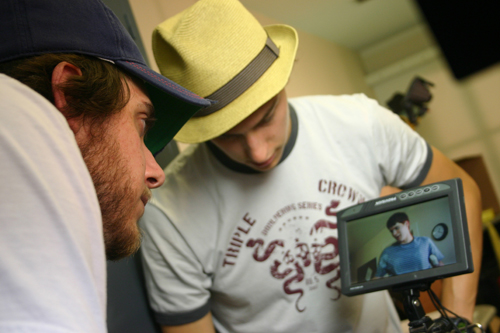
2010 – Editing: Time Is Money
Since The Nocturnal Third was entirely a DIY or DIWO (“do it with others”) film production, I was also functioning as editor and sound editor. This was actually a kind of relief, as it allowed the freedom to work with scenes and edits over time, yielding a better, tighter film. As I get more hours in as a feature-length film director, I’ll be able to make decisions more quickly, with less massaging, but on my first time out, I appreciated the flexibility. Once I had a rough first draft, I sent it to my former film professor and got beautifully harsh notes. After having a fever-induced dream, I cut the opening sequence of the film to be entirely non-linear, and I received resounding boos from my Producers, Cinematographer Stephen Lucas, Composer Jesse Ewing, and Production Designer Markus Matei. All of this feedback was very helpful, and helped to keep me balanced while I was trapped in my office, keeping strange hours and drinking too much coffee.
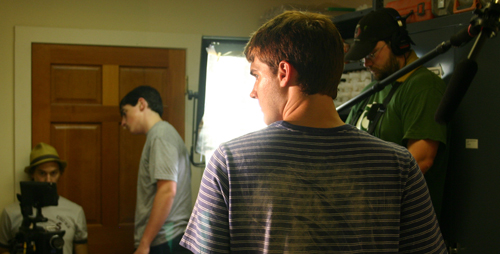
We broke several promises once we started setting a premiere date, and I still feel guilty about this. However, the film wasn’t finished, and all its necessary components (score, animation) were not bending to my whims. At the end of the process, I realized that when you do not have money, your greatest currency is time. You can rush to meet self-imposed deadlines, but if it is truly a collaborative project, these deadlines might not be properly established and researched. This is a helpful realization to dwell on as we move into development for our third feature film, which will hopefully be less frantic and desperate. I will try harder to make promises I can keep, both to my crew, my audience, and myself.
2011 & Beyond: What have I learned?
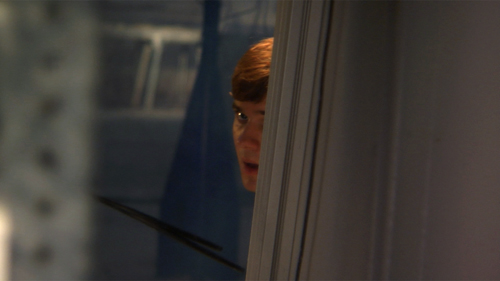
The process of writing, financing, producing, directing, editing, sound mixing, and marketing a feature film has been simultaneously exhilarating and boring, painful and ecstatic, intuitive and counter-intuitive. I had many preconceived notions about the process going in, even after my experience of producing a feature film of a similar nature, but many of them have been broken. I’m thankful that the film was a relatively small one, and that I can use this experience as a foundation on which to build future directorial endeavors. I think I’ll take a break from screenwriting and sound editing and even financing, if I can. I’m fully aware of the DIY filmmaking model and its boundary-pushing necessities, but I’m also happy I live in an age of filmmaking where networking and collaboration are seen as tools, rather than threats to the auteurist monarchy.
I would encourage other DIY filmmakers, especially those facing hardships, to take their eyes off of their dream for one moment and look around them. Perhaps what you need to get to the next step is something you can do now, with what you have, where you are.
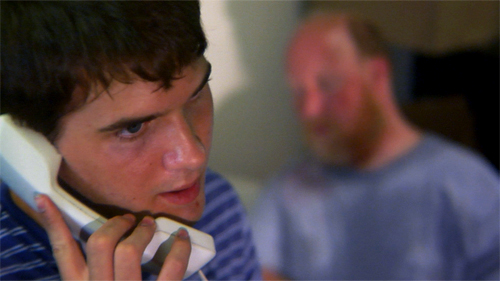
The Nocturnal Third premiered here in Huntsville and online on September 9, 2011. We have received mostly positive reviews from film writers, and are looking forward to introducing it to new audiences throughout 2012.
BIO:
Benjamin Stark is the Writer & Director of The Nocturnal Third.
Benjamin Stark was born in Heilbronn, Germany, before his family emigrated to Huntsville, Alabama in 1987. Stark graduated from the University of Alabama in 2006, formed Wonder Mill Films with Lee Fanning in 2007, and has directed seven shorts and one feature film. Wonder Mill Films is currently developing their third feature film, to be written by A Genesis Found writer/director Fanning and directed by Stark. During development, the group will also be producing an experimental short film project and working on a Southern roadshow that will show both The Nocturnal Third and A Genesis Found, as well as short films submitted by local filmmakers in Nashville, Birmingham, Raleigh, and Savannah. If you are a Southern filmmaker and you have a short that you’d like exhibited in one of these cities, please contact wondermill.roadshow – at – gmail.com. If you are a Southern filmmaker looking to connect with Wonder Mill Films, e-mail wondermillfilms – at- yahoo.com or find them on Twitter (@WonderMillFilms) or Facebook.
Photos courtesy of Gilbert Stark, Laura Albyn, and Stephen Martel Lucas. Poster designed by InkMatter.
Be sure to read Lee Fanning’s article:
Down the Lost Highway: Why I Toured My DIY Feature Through the American South
























